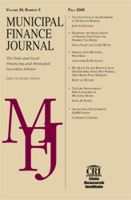Complete Issue
Author: W. Bartley Hildreth.
Source: Volume 22, Number 03, Fall 2001 , pp.1-93(93)

< previous article |return to table of contents
Abstract:
State and local governments face a major tax policy issue in simplifying the retail sales tax to accommodate electronic commerce. Since sales tax revenues serve as security for state and local debt issues, the features of this debate concern the municipal market. In a symposium organized by Professor Gary C. Cornia, tax scholars provide three articles that examine the implications of e-commerce on the sales tax. The first article tests the feasibility of a state-wide uniform local rate in California, Georgia, New York, Tennessee and Utah. A research team of expert economists, including Professors Gary C. Cornia, Kelly D. Edmiston, Steven M. Sheffrin, Terri A. Sexton, David L. Sjoquist and C.Kurt Zorn, integrates state case studies into a compelling review of the barriers to a uniform local sales tax rate for states. Economics Professors Donald Bruce and William F. Fox are at the forefront of estimating the sales tax impact of Internet-based transactions. For this symposium, they estimate, by state, the impact of direct local sales tax losses and the proportional loss of state-shared revenues. In the last of the three symposium articles, John Mikesell, public finance professor and co-author of the leading sales tax treatise, offers suggestions on how to preserve the sales tax as an equitable and efficient revenue source. Notwithstanding state simplification efforts, Professor Mikesell’s solution is for Congress to enact a national vendor registration structure for use tax collection. The impact of method of sale on borrowing cost continues to attract debate and research. Public administration professor Jun Peng and asset manager Peter F. Brucato notice that states turn to competitive-only laws to promote political accountability, as well as economic efficiency. Empirical results confirm that there is no negative effect on borrowing cost by competitive-only law, at least for the stable interest rate environment timeperiod and the high-quality credits covered in this study. In the tax law development column, attorneys Olivia Shay-Byrne and Lisa Brown provide an extensive review of the law on tax-exempt bonds for religious organizations.Keywords:
Affiliations:
1: Wichita State University.